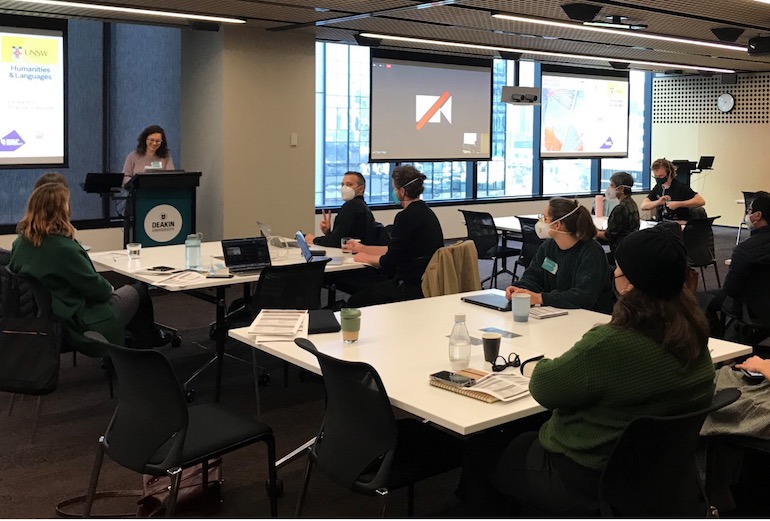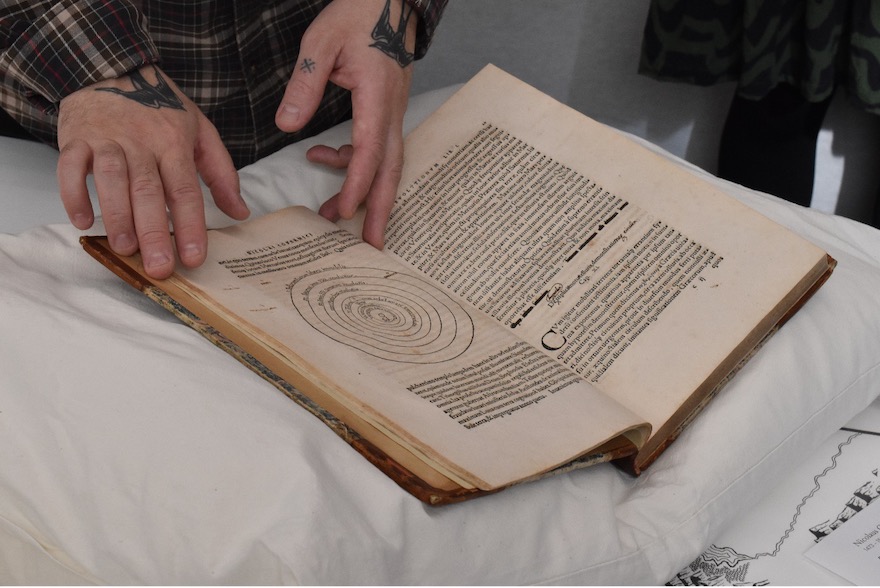In July 2022, early career and PhD Science and Technology Studies (STS) scholars met across four locations in Australia and Aotearoa (New Zealand) for the fourth Australasian STS Graduate Network Conference (AusSTS2022). Attendees gathered virtually for shared keynote sessions and each node in Melbourne, Sydney, Darwin, and Wellington subsequently hosted their own programs, including short presentations and field trips. Our shared theme was “generation,” and AusSTS2022 urged us to reflect on the diverse meanings of this word as temporal, relational, bounded, and multiple, reconsidering the ethical practice of STS in times of crisis. As an interdisciplinary PhD researcher at Deakin University I attended the Melbourne node of AusSTS2022, which this blog post will recount and reflect on.
The first day began at Deakin University with a thought-provoking keynote lecture by Professor Anne Pollock (King’s College London), focusing on the “generative element of contemporary intersectional STS.” Pollock began with reflections on a recent review essay in BioSocieties, co-authored with Vivette Garcia-Deister, which situated several texts focusing on race upon a spectrum of “bleak” to “aspirational” STS scholarship. Building from Bruno Latour’s reflections that critique is “running out of steam,” Pollock referred to Ruha Benjamin’s forthcoming memoir and manifesto, Viral Justice: How we Grow the World We Want, to suggest that it is cynicism instead that has run out of steam. While recognizing the benefits of “bleak” scholarship in its ability to offer critiques of contemporary society, Pollock’s use of Benjamin’s work demonstrated the way in which critique must be coupled with a normative project to name what we want to see more of in the world.

Carina Truyts of the Deakin Science and Society Network introducing keynote speaker, Anne Pollock. Photo by author.
A critical theme which emerged from Pollock’s keynote was the call to connect with the everyday. Pollock shared the generativity of everyday STS through her experience in writing her recent book, Sickening: Anti-Black Racism and Health Disparities in the United States, with undergraduate students as the imagined audience of the text. Reflecting on this process, Pollock highlighted that how STS scholars write of the everyday, and to which audiences, has implications for our normative projects and the capacity for research to transcend academic bounds. Writing with our students and everyday life in mind offers generative capacities to begin cultivating better worlds from critical practices. Pollock’s reflections of writing, teaching, and engaging in the everyday through STS was a timely reminder of the hopeful potential of research. By referring to the structure of Sickening, which avoided historical accounts as the introductory points to anti-Black racism, Pollock reminded us that engaging with the everyday is essential to combatting injustices. It is in these everyday relations that dynamics of power and oppression which shape injustices can be named and disrupted through generative relationships. As such, the keynote demonstrated the broader aims of hope through everyday connections we, as STS scholars, must center in our work to call out injustice and articulate better worlds.
With this keynote setting an inspiring tone, each AusSTS2022 node followed on with a series of presentations. The Melbourne program consisted of the following six presentation sessions: (1) futuring, (2) conserve, (3) interface, (4) metabolisms, (5) proxies, and (6) regeneration. In these seminar-style sessions, presenters shared a brief work-in-progress or provocation followed by audience discussion. This style of presentation was highly effective for an audience of interdisciplinary PhD and early-career researchers. By providing short works-in-progress, the question-and-answer segments of each session provided collaborative opportunities for the audience to share related works to presenters, with the latter actively workshopping ideas through open dialogue. This was a practice of generative knowledges. A few of these sessions are reflected on below.
“Futuring” featured talks spanning energy, epigenetics, and science fiction. Kari Dahlgren opened the session by sharing her experience of STS interventions into the everyday through energy research. Kari’s presentation demonstrated the way an engaged STS can actively transform critiques into alternatives by straddling epistemic boundaries across the academy, industry, and daily life. Natasha Rooney’s presentation proposed the role of STS in shifting the position of men in pre-conception care. Situated within broader research about the absence of men in the activity of monitoring epigenetic markers in pre-conception care, Natasha’s work challenged the binaries and norms and considered new forms of responsibility for care. The session was rounded out with Cameron McKean’s creative inquiry of academic engagement with genre and science-fiction as a form of everyday politics to gestate future worlds.
“Metabolisms” featured my own work on the practices of soil genealogies in urban agriculture, exploring urban metabolic processes beyond the body. Tyler King shared reflections on his research on urban multispecies entanglements between humans and bees through the practice of wildlife gardening, and Carina Truyts explored the contentious relationships between humans and flamingos at the Kimberly mining site in South Africa. While our presentations were connected by the theme of metabolism, bodily metabolic processes of ingestion and human waste were largely absent from the session. Instead, a common theme across the three presentations was the exploration of social and urban metabolisms through more-than-human relations, and the ways colonial and capital histories are ingested through urban space.
In “Regeneration,” Dan Santos explored his role in a project developing a commons-based framework for stem-cell research. A key concern with his work is the different outputs generated by groups concerned with stem-cell research, and how openness could be implemented and performed accordingly. Then Florin Douglas explored the role of transgenerative technologies, focusing on the Mirena, a hormonal intrauterine device. Florin’s work explored how the Mirena operates as a normalising device to generate specific forms and norms of gender, considering what this means for its use for trans-men and its implications for what is deemed “normal” for reproduction. The presentation offered the provocation of the impact gender essentialism has on reproductive technologies and trans access.
Pollock’s reflections on the first day were further explored in the Intergenerational Plenary that opened the second day of the workshop, streamed from the Wellington node. This plenary brought Hana Burgess, Mythily Meher, and Billy van Uitregt into conversation on their responsibilities to epistemic practices and generational potentials. The plenary challenged a Western and colonial idea of “generation” as a progressive and linear temporal practice, with Hana Burgess offering generous reflections on whakapapa (loosely translated to ancestry, although this does not capture its full meaning) as the foundation of Māori being as always in relation with past, present, and future. In this way, Māori are by their very being intergenerational and always evoking pasts and futures through relations. Elaborating on this, Billy van Uitregt further situated generativities within the everyday, calling for a shift from transactional to generative academic relations. These generative relationships do not take knowledge as a transaction, but as ongoing obligations to each other to create something which did not exist previously. Similar to Pollock’s call for the aspirational work of STS, Billy’s generative relations put into practice the calling out of inequities within the academy and the active ethical praxis of STS scholarship.
The final activities of the Melbourne node included two field trips to the State Library of Victoria and Melbourne Museum. Moving across the city to the State Library, we were fortunate to go behind the scenes and delve into the works of the rare books and conservation teams. The elasticity of the term “rare” became apparent as an array of contemporary zines and the first edition of Copernicus’ heliocentric theory were available for our viewing. Our ideas of what constitutes rare as situated in the past was challenged as we were told acquisitions have been published as recently as this decade. Moving into the conservation area, the team shared with us the meticulous efforts and materials used to conserve – and revive – works within the library. We ended our field trip with a guided tour through the Bunjilaka Aboriginal Cultural Centre at the Melbourne Museum. Diverse stories were generously shared by our guide, who shared the cultural practices – such as the generative and ongoing process of making possum skin cloaks from birth into adulthood – of south-eastern Aboriginal groups in the face of ongoing colonialism. Our time through Bunjilaka expressed the intimate generational entanglements of First Nations cultures, as shared by Hana Burgess earlier that morning, and the power of the everyday to cultivate ethical realities.

A curator of the State Library of Victoria’s Rare Books Collection shares the first edition of Copernicus’ heliocentric theory. Photo by author.
Throughout AusSTS2022, generation became increasingly seen as an everyday practice to grow new worlds out of critique. We were provoked to consider our normative intentions as STS practitioners, and to redraw the terms of relations beyond transaction into generative collaborations. Across two days of interdisciplinary engagements, AusSTS2022 offered the opportunity for PhD researchers to explore the everyday intimacies of our research which so often can be felt as niche and disconnected. Thinking about the everyday capacities of STS scholarship urges a rethinking of the nature of relationships beyond purely academic terms. Crossing these boundaries ultimately brings into relation new ways of thinking, being, and doing to actively disrupt the structures of injustice which sits as the object of our critique. AusSTS2022 provided an important and inspiring reminder of the potential of STS to offer hope in times of crisis, and the importance of always being in generative relations.
References
Garcia-Deister, V. & Pollock, A. 2021. “Bleak Biopolitics and Abolitionist Aspirations: Recent Books on Race.” BioSocieties 16: 574 – 581.
Latour, B. 2004. “Why has critique run out of steam? From matters of fact to matters of concern.” Critical Inquiry 30(2): 225 – 248.
